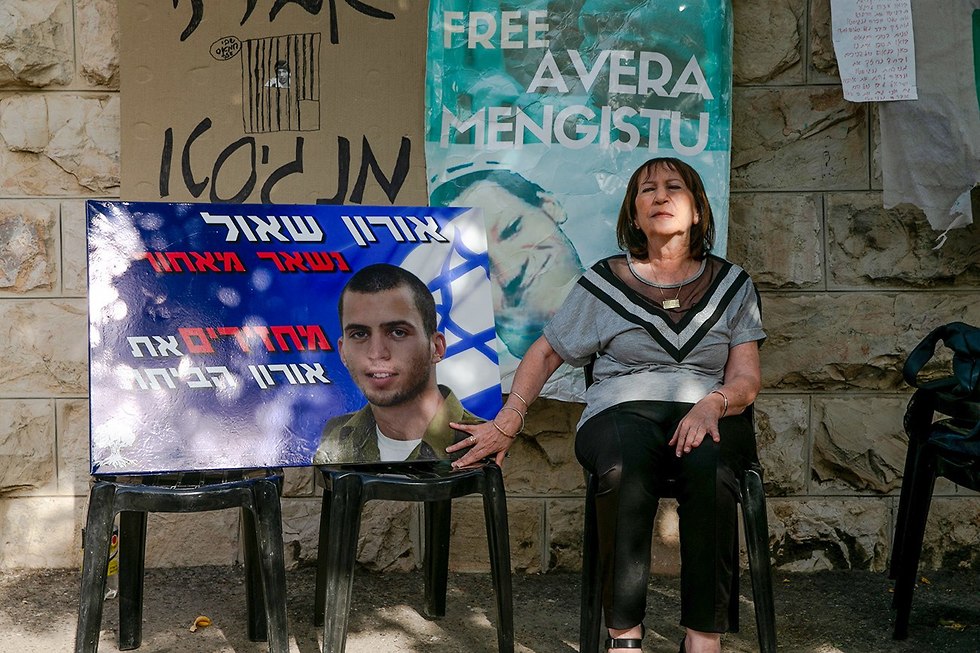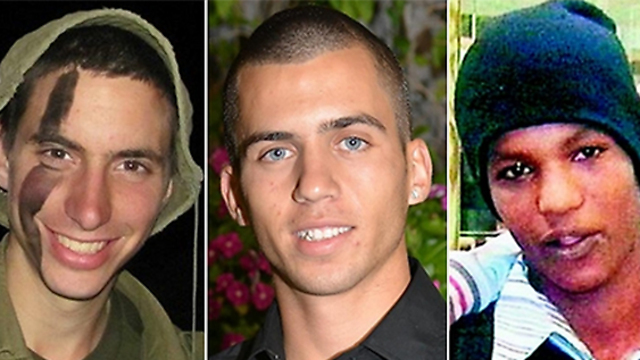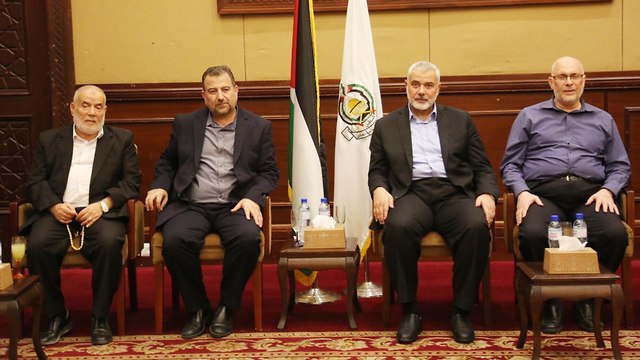

Shaul family: Deal with Hamas without MIAs, POWs will fail
In letter, family of fallen soldier Oron Shaul urges Prime Minister Netanyahu and the Security Cabinet not to sign ceasefire agreement with Gaza without return of fallen IDF soldiers, Israeli citizens being held by Hamas; 'It'll put a mark of shame on the State of Israel.'
The family plans to protest outside the Israeli Security Cabinet's meeting on Sunday, during which the ministers will discuss the wide-scale arrangement on the Gaza Strip. The ministers will be briefed on the discussions held under the auspices of UN Middle East envoy Nikolay Mladenov and the Egyptians.
Hamas's political leadership is meeting in Gaza on Friday to discuss the possible ceasefire deal, which is reported to include a sea port and an airport for Gaza in Egypt and the improvement of living conditions in the strip.
In a letter to the prime minister and the members of the Security Cabinet, the Shaul family wrote: "We turn to you at this fateful hour, on the eve of the meeting in which the Cabinet is due to make decisions on an agreement in Gaza (hudna)."
"We will preface by saying that any agreement that does not include the return of Oron, Hadar (Goldin), Avera and the other citizens (being held by Hamas) will not be worth the paper it's written on, or alternatively the understandings and verbal promises being made. Remember, this will all come back to us like a boomerang," the family warned.
IDF soldiers Shaul and Goldin were both killed during Operation Protective Edge in the Gaza Strip in the summer of 2014. Hamas has been holding their bodies ever since. Hamas is also holding two Israeli citizens who accidentally entered the strip—Avera Mengistu and Hisham al-Sayed, both of whom are believed to be alive.
"For this agreement to have any practical and moral validity, the first article must be the release of our sons. Only then will the agreement be strong and worthy," the family asserted.
They went on to stipulate that "an agreement that does not include the return of our sons is akin to a high-rise building without foundations. Our sons are the very heart and backbone of the agreement. An agreement without the return of our sons is a capitulation agreement that testifies and will testify to the weakness of our country. This will give the enemy the strength to violate the agreement from time to time, without fear."
Turning to Israelis, and particularly those living in Gaza border communities, the family stressed, "our sons went to defend you with their body and soul, they had the courage and bravery. Therefore, you are required by morality and conscience to oppose an agreement that abandons our sons," the family continued. "Furthermore, if the agreement does not include our sons, it will be doomed to fail. An agreement without our sons will not bring to the quiet and calm we long for."
Turning back to the prime minister, the family wrote: "You and we know the truth—if you had acted with a clean conscience, a pure heart and without foreign considerations, such as the electorate and political agenda—we would have had our sons back in their homeland a long time ago.
"In conclusion, we'll say unequivocally: had this matter been up to the defense establishment, our sons would've been home a long time ago. Abandoning our soldiers and citizens puts a mark of shame on the State of Israel."
Professor Simcha Goldin added that Israel’s interest should be first and foremost bringing back its soldiers.
"Ahead of the Security Cabinet meeting on Sunday, there are plenty of rumors … We won’t let the money reach Gaza before the soldiers are returned. The interest of the State of Israel is first and foremost to bring back the soldiers. It is clear to everyone, except for the prime minister and this needs to change.
"The UN envoy to the Middle East Nickolay Mladenov is responsible for the fact that Hadar is still not with us. Hadar was kidnapped during a ceasefire that was mediated by the UN, therefore the UN is responsible for bringing him back," Goldin concluded.
According to Lebanese newspaper Al Akhbar, the first stage of the ceasefire agreement will come into effect within a week and will include an end to "March of Return" protest activities on the Israel-Gaza border. In return, the Kerem Shalom border crossing will resume activity and the Rafah border crossing with Egypt will be reopened on a more permanent basis.
The second stage will include the improvement of living conditions in the Gaza Strip and the complete removal of the blockade, according to the Lebanese paper. Israel will allow the transfer of goods into the strip and increase the electricity it provides Gaza.
The third stage of the plan, according to the report, will include the launch of UN humanitarian projects already proposed in the past, including the construction of a sea port for Gaza in Ismailia, Egypt, operating an airport for the strip in Sinai, as well as the construction of a power plant in the Egyptian peninsula. In addition, the reconstruction of Gaza will go ahead.
Among the other incentives to the Palestinians in the plan is increasing the power supply to the strip to four additional hours a day, $31 million in aid from Qatar, and $91 million in aid for UNRWA. In addition, $10 million will be transferred to the strip to pay salaries to Palestinian Authority employees in the Gaza Strip.


















